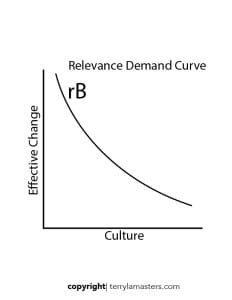Today the landscape of Christianity is changing and the metrics used to determine effectiveness have shifted from the Bible to culture. This has created great confusion and criticism of church styles, church culture, and methods used by the Church in an attempt to be culturally relevant. People are looking for something that is authentic and relevant, not historical and void of life.
This shift has taken place due to the lack of reconciliation between biblical soundness and cultural relevance. Compromise of principles and truth should remain, but the conversation around methods can and will change in an effort to present the word of God in the midst of a culture of opposition. These two ideas, biblical soundness, and cultural relevance are not mutually exclusive and only when combined together create maximum effectiveness.
Static systems are unable to account for different demand factors that create shifts.
Religion is a static system designed to demonstrate the power of a few; creating a following of people unto themselves. Jesus’ desire for the Church was not to be static, but to be a powerful organic body of believers centered on and around people. People have to be more important than the system. This does not mean we throw away structure and not have churches; it means we must change our mindset and shift from going to church to being the church as God designed and intended it to be.
So what is the problem? The problem is relevance. In the 90’s there was a survey in a southern city where a church was going to be planted and they asked a simple question: Why don’t you attend church? The numbers were sobering and are still true today. 74% of those surveyed felt there was no value in attending church. 34% believed the church had no relevance to the way they lived.
The greatest critics of the church today are not from the secular world but within Christianity.
Many churches are attempting to reconcile biblical soundness and cultural relevance, but are met with resistance and criticism. The problem is the criticism is coming from a place of being static while the world changes. Pastors and leaders are passing judgment through metrics based on comparisons and insecurity trying to find fault with others while not addressing the real issue; ineffectiveness based on irrelevance.
The Church needs to become prominent in our culture again.
We need to become co-builders with Christ who is the head of the Church and make a difference in our culture. We need to focus on Jesus and making the word of God relevant and applicable to the culture today. Relevance is staying true to the word of God while making it applicable to current culture. It means answering the question that people are asking. The result is shown on the Relevance Demand Curve below. The more biblical relevance (rB) we can bring to the culture, the more effective change will take place.
The metrics to measure effectiveness within our culture should be:
-
- Is Jesus the main thing?
- Is the community the church is in different because of it?
- Are people getting saved?
- Are people moving from salvation to discipleship?
- Is the Bible applied to everyday life circumstances?
- Is the church known for its love outward?
- Is the Church answering the question that people are asking?



